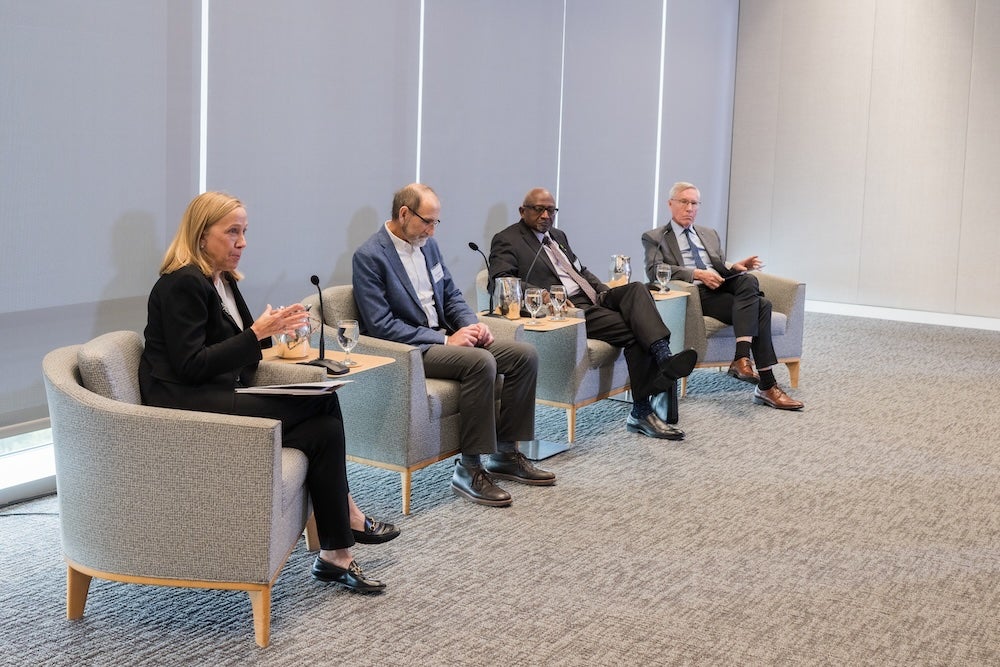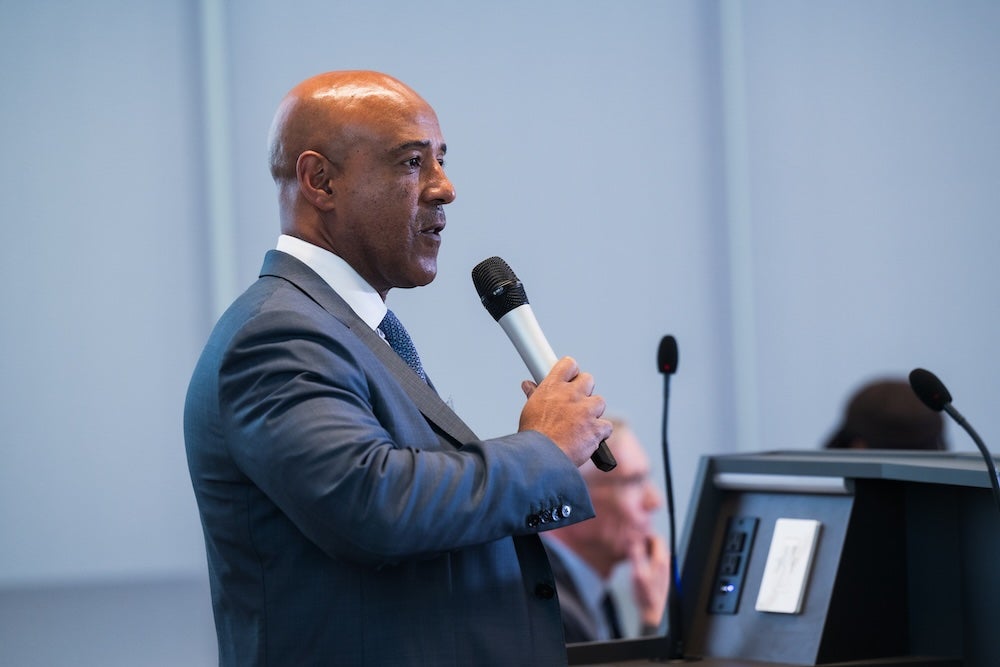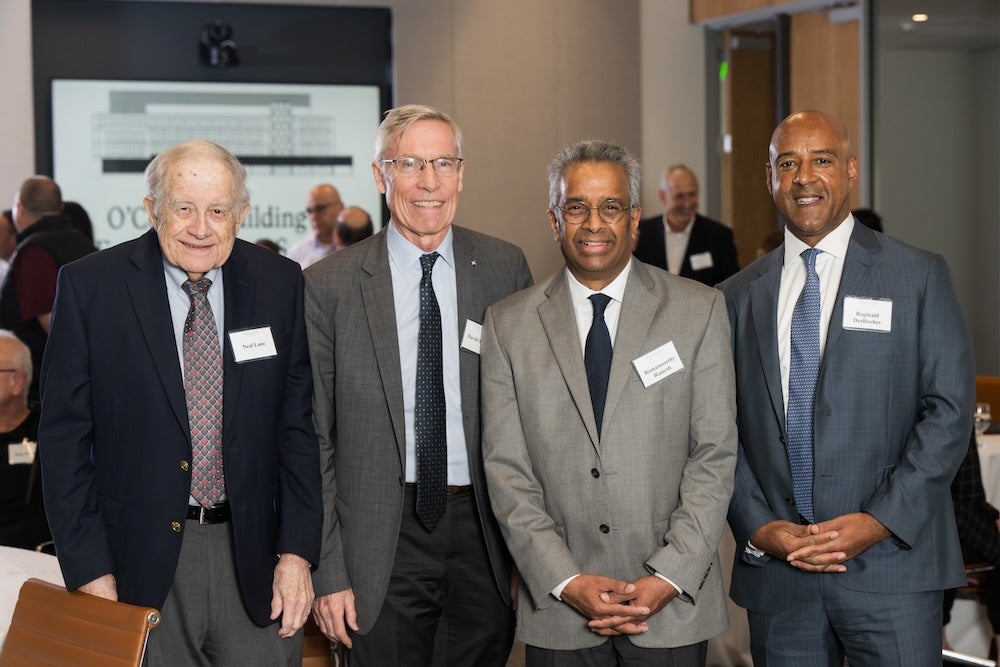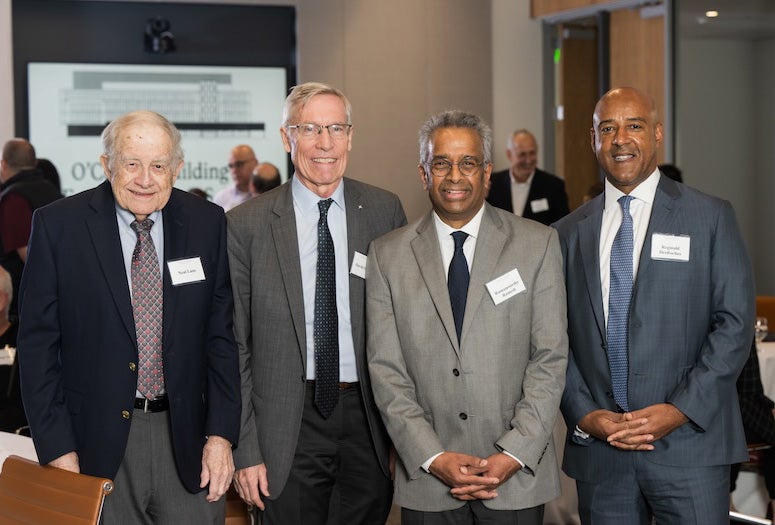Rice University, in collaboration with the Houston Program Committee of the American Academy of Arts and Sciences, hosted a panel discussion on climate action featuring academy members and guests March 18 at the Ralph S. O'Connor Building for Engineering and Science.
Titled “Accelerating Climate Action Across America,” the event invited a conversation on how to “achieve ambitious and durable action on climate change” and served as an occasion to engage with the academy’s recent report, Forging Climate Solutions: How to Accelerate Action Across America.
The discussion was moderated by David Oxtoby, president of the academy, and featured Robert Bullard , founding director of the Bullard Center for Environmental and Climate Justice and distinguished professor of urban planning and environmental policy at Texas Southern University; Patricia Collawn, chair and CEO of PNM Resources; and Christopher Field, the Perry L. McCarty Director of the Stanford Woods Institute for the Environment and Melvin and Joan Lane Professor for Interdisciplinary Environmental Studies at Stanford University. Rice’s Executive Vice President for Research Ramamoorthy Ramesh was the official host of the event.

In his opening remarks, Rice President Reginald DesRoches noted the academy “is a historic and renowned society made up of some of the world’s most innovative thinkers and scholars [whose] commitment to multidisciplinary, nonpartisan research to solve global challenges resonates with what we do here at Rice.” In addition to plans of growing the university by 20 %, adding 200 faculty across all eight schools, and embarking on the most ambitious capital campaign in the university’s history, DesRoches mentioned the recent launch of five new institutes as well as five research centers to foster interdisciplinary collaboration and drive innovation.
“These new institutes will harness the expertise Rice has in these critical areas to solve some of the world’s most pressing challenges in health and medicine, energy and climate, urban resilience, and much more,” DesRoches said. “I strongly believe that Houston … is well positioned to be the energy transition capital of the world, and Rice is partnering with companies and organizations in Houston and with institutions around the world to make that happen.”
Several panelists and guests at the event were members of the Commission on Accelerating Climate Action launched by the academy in 2021. A “bipartisan and multisectoral” group of 31 experts from diverse backgrounds ranging from industry and government to academia and the arts, the commission was tasked with identifying roadblocks to climate action and recommending strategies for overcoming them with the result of their efforts published in the Forging Climate Solutions report in October 2023.

Oxtoby said the “report offers a blueprint for our nation’s response to climate change in a way that coordinates efforts across sectors, ideological divides and the many other forms of diversity that characterize our nation.”
“It’s been a very exciting project with the academy,” Oxtoby said. “Houston and Rice University are at the center of action in this area. There’s so much work going on in this space ⎯ basic research, connections to the city of Houston, it’s ground zero for action on climate.”
One of the overarching themes of the discussion was justice in the context of climate action. Bullard, a leading figure of the U.S. environmental justice movement, argued for the importance of taking into account all forms of knowledge in decision-making processes rather than granting some disciplines a privileged status.
“Climate change will impact the most vulnerable, it will exacerbate existing inequalities,” Bullard said. “Climate change is more than parts per million in greenhouse gases. I think the real solutions … oftentimes reside in addressing the equity and justice lens,” which involves “bringing the various disciplines to the table ⎯ humanities, social sciences along with the so-called hard sciences and engineering.”

Ramesh framed the event in the broader context of the university’s commitment to strengthen and expand its research ecosystem, arguing that, “under the new leadership,” Rice will play an increasingly greater role in the discussion and action on climate. Ramesh emphasized the complexity of the climate challenge, echoing Bullard’s argument for the necessity of a multidisciplinary approach to building an effective roadmap to the energy transition.
“It’s not a simple topic,” Ramesh said, invoking Rice's Sustainability Institute as an example of the kind of multidisciplinary engagement the climate challenge demands. “All the eight schools, including the Shepherd School of Music, are involved in it. The Baker is involved. Why? Because it’s such a complicated problem. It’s got a social component, a human component, a policy component and of course a science and technology component.”
Ramesh also thanked Neal Lane, Rice’s Malcolm Gillis University Professor Emeritus and senior fellow in science and technology policy at the Baker Institute for Public Policy, for his role connecting university and academy representatives, enabling the latter to broaden the reach of efforts to catalyze action on climate.
“We made a real effort to interact with congressional offices, with business groups, with civic society, and we think that the message will only pick up traction if people start internalizing it and changing their behavior in a way that reflects the opportunities that it opens up,” Field said.
- Video is available at:
-
https://www.youtube.com/watch?v=rkXo_GAf86w
(Video by Brandon Martin/Rice University) - Image downloads:
-
https://news-network.rice.edu/news/files/2024/03/240318_FOF_Fitlow_005-073cd98c309ab962.jpg
CAPTION: Neal Lane (from left), David Oxtoby, Ramamoorthy Ramesh and Reginald DesRoches (Photo by Jeff Fitlow/Rice University)
https://news-network.rice.edu/news/files/2024/03/240318_FOF_Fitlow_006-379270e5c336370a.jpg
CAPTION: Rice University President Reginald DesRoches (Photo by Jeff Fitlow/Rice University)
https://news-network.rice.edu/news/files/2024/03/240318_FOF_Fitlow_018-5f42f2daa5743254.jpg
CAPTION: Patricia Vincent-Collawn (from left), Christopher Field, Robert Bullard and David Oxtoby. (Photo by Jeff Fitlow/Rice University)
https://news-network.rice.edu/news/files/2024/03/240318_FOF_Fitlow_020-02da8285f6e0e0a3.jpg
(Photo by Jeff Fitlow/Rice University)

